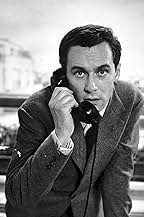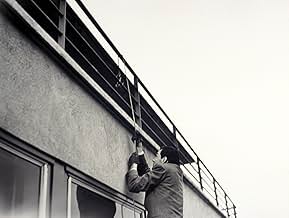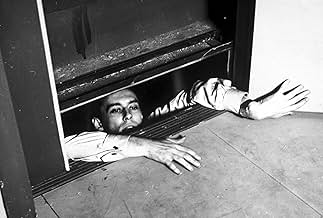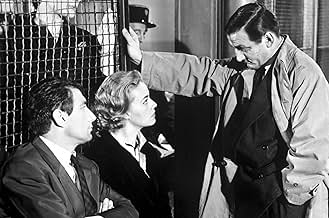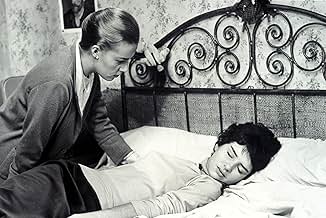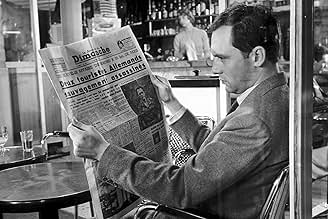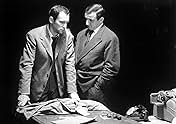IMDb RATING
7.9/10
30K
YOUR RATING
A self-assured businessman murders his employer, the husband of his mistress, which unintentionally provokes an ill-fated chain of events.A self-assured businessman murders his employer, the husband of his mistress, which unintentionally provokes an ill-fated chain of events.A self-assured businessman murders his employer, the husband of his mistress, which unintentionally provokes an ill-fated chain of events.
- Awards
- 1 win total
Featured reviews
Ascenseur pour l'échafaud (AKA: Elevator to the Gallows/Lift to the Scaffold) is directed by Louis Malle and co-written by Malle, Roger Nimier and Noël Calef (novel). It stars Jeanne Moreau, Maurice Ronet, Georges Poujouly, Yori Bertin and Jean Wall. Music is by Miles Davis and cinematography by Henri Decaë.
A little ole devil this one, a sly slow pacer that itches away at your skin. Rightly seen as a bridging movie between the classic film noir cycle and the nouvelle vague, Malle's movie is in truth straightforward on narrative terms. Julien Tavernier (Ronet) is going to kill husband of his lover, Florence Carala (Moreau), who also happens to be his boss, but upon executing the perfect murder, he, through his own absent mindedness, winds up stuck in a lift close to the crime scene. Outside Florence is frantically awaiting his arrival so as to begin their life together in earnest, but when a couple of young lovers steal Julien's car, Florence gets the wrong end of the stick and a sequence of events lead to Julien and Florence hitching that ride to the gallows.
Simplicity of narrative be damned, Malle's movie is a classic case of that mattering not one jot. There is style to burn here, with bleak atmospherics dripping from every frame, and Miles Davis' sultry jazz music hovers over proceedings like a sleazy grim reaper. The ironic twists in the writing come straight off the bus to noirville, putting stings in the tale, the smart reverse of the norm finding Moreau (sensual) wandering the streets looking for her male lover, while elsewhere he's in isolation and a doppleganger murder scenario is cunningly being played out. Decaë's photography has a moody desperation about it that so fits the story, the use of natural light making fellow French film makers sit up and take notice. While the dialogue, and the caustic aside to arms dealings, ensures we know that Malle can be a sly old fox. He really should have done more noir like pictures.
A film that convinces us that Julien and Florence are deeply in love and passionate about each other, and yet they never are once together in the whole movie! It's just one of the many wonderful things about Louis Malle's excellent picture.
Remember folks, the camera never lies... 9/10
A little ole devil this one, a sly slow pacer that itches away at your skin. Rightly seen as a bridging movie between the classic film noir cycle and the nouvelle vague, Malle's movie is in truth straightforward on narrative terms. Julien Tavernier (Ronet) is going to kill husband of his lover, Florence Carala (Moreau), who also happens to be his boss, but upon executing the perfect murder, he, through his own absent mindedness, winds up stuck in a lift close to the crime scene. Outside Florence is frantically awaiting his arrival so as to begin their life together in earnest, but when a couple of young lovers steal Julien's car, Florence gets the wrong end of the stick and a sequence of events lead to Julien and Florence hitching that ride to the gallows.
Simplicity of narrative be damned, Malle's movie is a classic case of that mattering not one jot. There is style to burn here, with bleak atmospherics dripping from every frame, and Miles Davis' sultry jazz music hovers over proceedings like a sleazy grim reaper. The ironic twists in the writing come straight off the bus to noirville, putting stings in the tale, the smart reverse of the norm finding Moreau (sensual) wandering the streets looking for her male lover, while elsewhere he's in isolation and a doppleganger murder scenario is cunningly being played out. Decaë's photography has a moody desperation about it that so fits the story, the use of natural light making fellow French film makers sit up and take notice. While the dialogue, and the caustic aside to arms dealings, ensures we know that Malle can be a sly old fox. He really should have done more noir like pictures.
A film that convinces us that Julien and Florence are deeply in love and passionate about each other, and yet they never are once together in the whole movie! It's just one of the many wonderful things about Louis Malle's excellent picture.
Remember folks, the camera never lies... 9/10
The former Captain Julien Tavernier (Maurice Ronet) works in the company of the powerful arms dealer Simon Carala (Jean Wall) and is the lover of his wife Florence Carala (Jeanne Moreau). Julien and Florence plot a scheme to kill Simon simulating a suicide. Julien stays after-hours in the company with the telephone operator and the doorman and comes to his office. He climbs to Simon's office using a rope outside the window and kills the executive. He runs to his office to attend a phone call and forgets the rope, and leaves the building with the two employees to have an alibi. When he is ready to drive his car, he sees the rope hanging outside the building and he returns to withdraw the rope, leaving his overcoat and revolver in the car. When he enters in the lift, the doorman shutdown the building and Julien is trapped inside the elevator.
Meanwhile the smalltime thief Louis (Georges Poujouly) steals Julien's car and drives to a motel with his girlfriend Véronique (Yori Bertin) and lodge using the name of Julien. They drink with the German tourists Horst Bencker (Iván Petrovich) and his wife Frieda Bencker (Elga Andersen) and early in the morning, Louis tries to steal his Mercedes Benz. When he is surprised by Horst, Louis shots and kills the couple. Julien Tavernier becomes the prime suspect of the murder and when he leaves the lift, he does not have alibi for the murder of Simon Carala and the German tourists.
"Ascenseur pour l'Échafaud" is the first feature of Louis Malle, who is also one of the writers. The unpredictable and original story is fantastic, the screenplay has many plot points until the very last scene and the performances are top-notch.
Julien Tavernier is a methodic military with cold blood that gets caught between the rock and a hard place due to a mistake and lots of bad luck. The soundtrack with the music of Miles Davis gives a touch of class to this little masterpiece. The result is one of the best thrillers entwined with comedy of errors that I have ever seen. My vote is nine.
Title (Brazil): "Ascensor Para o Cadafalso" ("Elevator to the Gallows")
Meanwhile the smalltime thief Louis (Georges Poujouly) steals Julien's car and drives to a motel with his girlfriend Véronique (Yori Bertin) and lodge using the name of Julien. They drink with the German tourists Horst Bencker (Iván Petrovich) and his wife Frieda Bencker (Elga Andersen) and early in the morning, Louis tries to steal his Mercedes Benz. When he is surprised by Horst, Louis shots and kills the couple. Julien Tavernier becomes the prime suspect of the murder and when he leaves the lift, he does not have alibi for the murder of Simon Carala and the German tourists.
"Ascenseur pour l'Échafaud" is the first feature of Louis Malle, who is also one of the writers. The unpredictable and original story is fantastic, the screenplay has many plot points until the very last scene and the performances are top-notch.
Julien Tavernier is a methodic military with cold blood that gets caught between the rock and a hard place due to a mistake and lots of bad luck. The soundtrack with the music of Miles Davis gives a touch of class to this little masterpiece. The result is one of the best thrillers entwined with comedy of errors that I have ever seen. My vote is nine.
Title (Brazil): "Ascensor Para o Cadafalso" ("Elevator to the Gallows")
A self-assured business man murders his employer, the husband of his mistress, which unintentionally provokes an ill-fated chain of events.
Journalist Barry Farrell wrote, "Moreau had 20 forgettable films behind her... Malle put Moreau under an honest light and wisely let his camera linger. The film was nothing special, but it did accomplish one thing: it proposed a new ideal of cinematic realism, a new way to look at a woman. All the drama in the story was in Moreau's face – the face that had been hidden behind cosmetics and flattering lights in all her earlier films." Farrell is certainly right about the portrayal of Moreau. How can you make a leading lady anything but glamorous? Malle found a way that was quite successful.
As for the film being "nothing special", I think Farrell is wrong. A 1950s French film noir that is well executed? This is something we need more of. Starting with a murder and then spreading out from there, this is a good story of suspense, intrigue and all that. The whole concept of being caught in an elevator is incredible, and probably unprecedented.
Journalist Barry Farrell wrote, "Moreau had 20 forgettable films behind her... Malle put Moreau under an honest light and wisely let his camera linger. The film was nothing special, but it did accomplish one thing: it proposed a new ideal of cinematic realism, a new way to look at a woman. All the drama in the story was in Moreau's face – the face that had been hidden behind cosmetics and flattering lights in all her earlier films." Farrell is certainly right about the portrayal of Moreau. How can you make a leading lady anything but glamorous? Malle found a way that was quite successful.
As for the film being "nothing special", I think Farrell is wrong. A 1950s French film noir that is well executed? This is something we need more of. Starting with a murder and then spreading out from there, this is a good story of suspense, intrigue and all that. The whole concept of being caught in an elevator is incredible, and probably unprecedented.
Louis Malle was all of 25 when he made his directorial debut with this 1958 noirish thriller that also serves as a morality play. Using the elevator of the title as a vehicle for his leitmotif, he does an admirable job of capturing the smoky gray atmosphere of Paris in the 1950's and using it to great cinematic effect on a chain-link story of deception and murder. In fact, the whole movie plays like a Francophile version of a James M. Cain novel times two with plot twists coming in quick and sometimes contrived succession. To its credit, the brief 92-minute running time trots by quickly given the multiple story lines.
The labyrinth story focuses first on illicit lovers Florence Carala, the restless wife of a corrupt arms dealer, and Julien Tavernier, a former war hero working for Florence's husband. There is not a wasted moment as they plot her husband's murder, but of course, things go awry with a forgotten piece of evidence and a running car ready to be taken. An amoral young couple, sullen and resentful Louis and free-spirited Veronique, enter the scene tangentially and get caught up in their own deceptions with a boisterous German couple whom they meet through a fender bender. The plot strands meander somewhat and eventually come together in a climax that has all the characters confronting the harsh reality of their past actions. There is a particular poignancy in the photos Florence sees at the end since we have no indication of the depth of emotion between the lovers otherwise.
Malle, along with co-screenwriter Roger Nimier, presents an interesting puzzle full of irony and chance events, but there is a periodic slackness to the suspense, for instance, Florence's endlessly despondent walk though nocturnal Paris. Jazz great Miles Davis contributes a fitting hipster score, though the music is not as big an element as I expected in setting the mood. With her sorrowful eyes and pouting intelligence, Jeanne Moreau makes a vivid impression as Florence and gives her obsessed character the necessary gravitas to make her journey worthy of our interest. Maurice Ronet effectively plays Julien like a coiled spring throughout, and it's intriguing to note how most of his performance takes place in an immobilized elevator. As Louis and Veronique, Georges Poujuloy and the especially pixyish Yori Bertin are the forerunners for the runaway pair in Jean-Luc Godard's "Breathless" replete with youthful angst and mercenary cool.
The print transfer on the 2006 Criterion Collection DVD package is wonderfully pristine. The first disc also contains the original and 2005 re-release trailers, though there is surprisingly no scholarly audio commentary track (the usual bonus for a Criterion release). The second disc, however, makes up for it with a bevy of extras starting with an extensive 1975 early career retrospective interview with Malle, a 2005 interview with an aged but still haunting Moreau, and a joint interview with the two icons and one-time lovers at the 1993 Cannes Film Festival.
Three shorts on the second disc focus on Davis's contribution - the six-minute "The Record Session" shot the night Davis and his musicians recorded the score; a remembrance piece with pianist Rene Utreger, the only surviving member of Davis's ensemble; and the celebratory "Miles Goes Modal: The Breakthrough Score to Elevator to the Gallows" where jazz trumpeter Jon Faddis and music critic Gary Giddins discuss Davis's influence over the generation of musicians to come. There is also a short by Malle set to Charlie Parker's "Crazeology" and an informative 25-page photo essay booklet.
The labyrinth story focuses first on illicit lovers Florence Carala, the restless wife of a corrupt arms dealer, and Julien Tavernier, a former war hero working for Florence's husband. There is not a wasted moment as they plot her husband's murder, but of course, things go awry with a forgotten piece of evidence and a running car ready to be taken. An amoral young couple, sullen and resentful Louis and free-spirited Veronique, enter the scene tangentially and get caught up in their own deceptions with a boisterous German couple whom they meet through a fender bender. The plot strands meander somewhat and eventually come together in a climax that has all the characters confronting the harsh reality of their past actions. There is a particular poignancy in the photos Florence sees at the end since we have no indication of the depth of emotion between the lovers otherwise.
Malle, along with co-screenwriter Roger Nimier, presents an interesting puzzle full of irony and chance events, but there is a periodic slackness to the suspense, for instance, Florence's endlessly despondent walk though nocturnal Paris. Jazz great Miles Davis contributes a fitting hipster score, though the music is not as big an element as I expected in setting the mood. With her sorrowful eyes and pouting intelligence, Jeanne Moreau makes a vivid impression as Florence and gives her obsessed character the necessary gravitas to make her journey worthy of our interest. Maurice Ronet effectively plays Julien like a coiled spring throughout, and it's intriguing to note how most of his performance takes place in an immobilized elevator. As Louis and Veronique, Georges Poujuloy and the especially pixyish Yori Bertin are the forerunners for the runaway pair in Jean-Luc Godard's "Breathless" replete with youthful angst and mercenary cool.
The print transfer on the 2006 Criterion Collection DVD package is wonderfully pristine. The first disc also contains the original and 2005 re-release trailers, though there is surprisingly no scholarly audio commentary track (the usual bonus for a Criterion release). The second disc, however, makes up for it with a bevy of extras starting with an extensive 1975 early career retrospective interview with Malle, a 2005 interview with an aged but still haunting Moreau, and a joint interview with the two icons and one-time lovers at the 1993 Cannes Film Festival.
Three shorts on the second disc focus on Davis's contribution - the six-minute "The Record Session" shot the night Davis and his musicians recorded the score; a remembrance piece with pianist Rene Utreger, the only surviving member of Davis's ensemble; and the celebratory "Miles Goes Modal: The Breakthrough Score to Elevator to the Gallows" where jazz trumpeter Jon Faddis and music critic Gary Giddins discuss Davis's influence over the generation of musicians to come. There is also a short by Malle set to Charlie Parker's "Crazeology" and an informative 25-page photo essay booklet.
10noralee
"Elevator to the Gallows (Ascenseur pour l'échafaud)" is a master work, so it's startling to learn that it was Louis Malle's first feature. It's a mother lode textbook of how-to for noir genre filmmakers as he creates his own style from what he's learned from other masters.
Malle pays tribute to the tense murder style of Hitchcock with Billy Wilder's cynicism of selfishness a la "Double Indemnity" plus Graham Greene-like, post-war politics from "The Third Man"-- and arms and oil dealers with military pasts in the Middle East are not outdated let alone adulterous lovers and rebellious teenagers.
The film drips with sex and violence without actually showing either -- sensuous Jeanne Moreau walking through a long, rainy Paris night is enough to incite both.
The black and white cinematography by Henri Decaë is breathtakingly beautiful in this newly struck 35 mm print, from smokey cafés with ever watchful eyes like ours to the titular, ironic alibi's long shafts (which surely must have inspired a key, far paler scene in "Speed") to highway lights, to a spare interrogation box, but particularly in the street scenes. The coincidences and clues are built up, step by step, visually, including the final damning evidence.
Miles Davis's improvisations gloriously and agitatedly burst forth as if pouring from the cafés and radios, but the bulk of the film is startlingly silent, except for ambient sounds like rain that adds to the tension in the plot.
The characters are archetypes -- the steely ex-Legonnaire, the James Dean and Natalie Wood imitators, the preening prosecutor -- that fit together in a marvelous puzzle. But all are cool besides Moreau's fire, as she dominates the look of the film, just wandering around Paris.
There is some dialog that doesn't quite make sense at the end, but, heck, neither does "The Big Sleep" and this is at least in that league, if not higher in the pantheon.
Malle pays tribute to the tense murder style of Hitchcock with Billy Wilder's cynicism of selfishness a la "Double Indemnity" plus Graham Greene-like, post-war politics from "The Third Man"-- and arms and oil dealers with military pasts in the Middle East are not outdated let alone adulterous lovers and rebellious teenagers.
The film drips with sex and violence without actually showing either -- sensuous Jeanne Moreau walking through a long, rainy Paris night is enough to incite both.
The black and white cinematography by Henri Decaë is breathtakingly beautiful in this newly struck 35 mm print, from smokey cafés with ever watchful eyes like ours to the titular, ironic alibi's long shafts (which surely must have inspired a key, far paler scene in "Speed") to highway lights, to a spare interrogation box, but particularly in the street scenes. The coincidences and clues are built up, step by step, visually, including the final damning evidence.
Miles Davis's improvisations gloriously and agitatedly burst forth as if pouring from the cafés and radios, but the bulk of the film is startlingly silent, except for ambient sounds like rain that adds to the tension in the plot.
The characters are archetypes -- the steely ex-Legonnaire, the James Dean and Natalie Wood imitators, the preening prosecutor -- that fit together in a marvelous puzzle. But all are cool besides Moreau's fire, as she dominates the look of the film, just wandering around Paris.
There is some dialog that doesn't quite make sense at the end, but, heck, neither does "The Big Sleep" and this is at least in that league, if not higher in the pantheon.
Did you know
- TriviaMiles Davis recorded the music in a single recording session while he watched a screening. He composed it while watching a rough cut and then invited a quartet of French and US musicians in a for few hours (from 11pm to 5am one night), improvising each number and allegedly sipping champagne with Jeanne Moreau and Louis Malle.
- GoofsWhen Florence arrives at the motel, the photos are just being developed - with the lights on! Exposing the prints to light before fixation would make them turn black. By the way, it's not recommended to put your hands into developer.
- Quotes
Julien Tavernier: Don't sneer at war. It's your bread and butter. Indochina netted you how much? And now Algeria. Have some respect for war. It's your family heirloom.
- SoundtracksAscenseur Pour L'Échafaud (Générique)
Composed by Miles Davis
Performed by Miles Davis (Trumpet), Barney Wilen (Tenor Saxophone), Emilhenco (as René Urtreger) (Piano), Pierre Michelot (Bass) and Kenny Clarke (Drums)
- How long is Elevator to the Gallows?Powered by Alexa
Details
- Release date
- Country of origin
- Official sites
- Languages
- Also known as
- Frantic
- Filming locations
- 26 Rue de Courcelles, Paris 8, Paris, France(Tavernier climbing on the upper terrace)
- Production company
- See more company credits at IMDbPro
Box office
- Gross US & Canada
- $374,671
- Opening weekend US & Canada
- $7,354
- Jun 26, 2005
- Gross worldwide
- $431,784
- Runtime1 hour 31 minutes
- Color
- Aspect ratio
- 1.66 : 1
Contribute to this page
Suggest an edit or add missing content

Top Gap
By what name was Elevator to the Gallows (1958) officially released in India in English?
Answer

